Cloud storage services offer an easy and convenient way for you to save, organize, and share files.
The way it works is simple: Instead of storing your files and documents in an on-site physical server, you rent out space on a third-party company’s server to store your files. Doing so allows you to easily scale your storage capacity, while also keeping crucial files safe from accidents on-site that could destroy them.
Nowadays, it seems like every big tech corporation is offering its very own storage service. Even smaller companies and brands are getting into the game as well.
With so many options out there, it can be pretty dizzying. How are you supposed to pick one?
We’ve taken a look at dozens of different cloud storage services on the market. Below is our in-depth review of each one. We’ll walk you through the pros, cons, prices, features, specs, and any other consideration you’ll need to make an informed decision about cloud storage services.
• Best for backups
• File syncing, multiple device backups, and more
• 256-bit AES encryption
• Prices start FREE
• Try it today
5 Best Cloud Storage Services
The 5 cloud storage services that we like are:
- iDrive – Best for backups
- Google Drive – Best free cloud storage service
- Microsoft OneDrive – Best for home use
- Apple’s iCloud – Most intuitive cloud storage service
- Dropbox – Best all-around cloud storage solution
Keep reading for our in-depth reviews of each cloud storage service below.
#1. iDrive – Best for backups
• Best for backups
• File syncing, multiple device backups, and more
• 256-bit AES encryption
• Prices start FREE
• Try it today
In fact, they’re offering a promotional deal now that gives you 50% off your first year. For a Personal Plan, that’s $52.12. And for a Business Plan, that’s $74.62.
On top of that, they give you the standard features you should come to expect in a good cloud storage solution such as:
- File syncing
- Backups for multiple devices (PCs, Macs, Android, and iOS)
- Data protection
- Mobile app
- 24/7 customer support
They also come with their own unique features such as IDrive Express. This service allows you to backup several gigabytes of data onto a temporary storage device sent from IDrive.Then you can return the drive to IDrive once you’re done.
There’s no bandwidth usage for data transfers. And your data is kept secure using their 256-bit AES encryption—the same encryption used by the best VPN services as well as the military.
IDrive is also incredibly fast, leveraging a unique method of transferring data that allows them to do so. “IDrive transfers only the modified portions of your files after full initial transfer, by transferring only modified blocks of the file, which optimizes your bandwidth usage and ensures that transfers are quick,” reads their website.
IDrive offers three plans:
- Basic (5 GB) – Free
- Personal (5 TB) – $52.12 for the first year
- Business (250 GB) – 74.62 for the first year
Remember: Those are promotional rates. They’re going to jump after your first year is finished. The Personal and Business plans also offer different sub-plans as well, allowing you to scale for more storage if you need it.
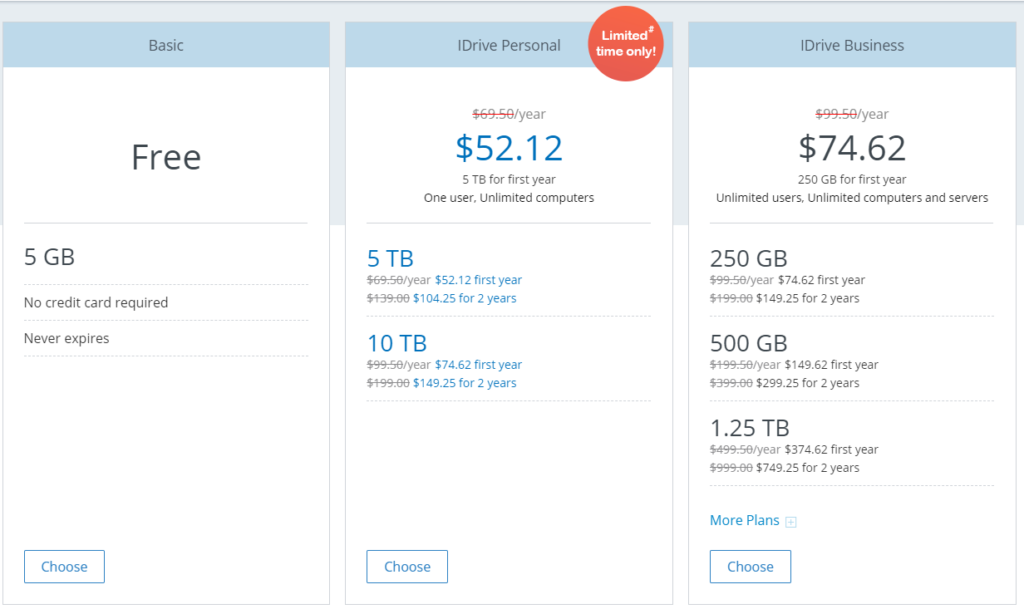
#2. Google Drive – Best free cloud storage service
• Best free cloud storage service
• 15 GB of free storage
• Integrates with Trello, Slack, and more
• Easy to use
• Try it today
And there’s a good reason for that. Google Drive offers an excellent free cloud storage solution completely free of charge.
Not only do you get 15 GB of storage space (a huge amount of storage considering it’s free), but it’s also integrated with a vast majority of products and services you already use like:
- Trello
- Slack
- Adobe products
- Salesforce
- DocuSign
Google Drive makes it very easy to share and sync files as well. You have the option to restrict access to certain users and email addresses, as well as give people edit access to certain files.
As such, if you already use a Google service such as GMail, GSuite, or an Android device, you should definitely use Google Drive as well.
As for drawbacks, the interface isn’t the best out there. For example, it’s difficult to figure out how to give people access to certain files. Also, if you’re trying to view a Word document or PDF, the service does its best to make you view it on a Google product such as Google Docs or Google PDF Viewer.
If you’re just looking for a personal cloud storage device or if your business is relatively small, I highly suggest using Google Drive. You’re getting a whopping 15 GB in storage space for free. It’s a fantastic deal.
Beyond the free plan, Google currently offers a suite of products under Google One. The step above the free plan is their 100 GB plan which runs just $1.99/month. Another great deal.
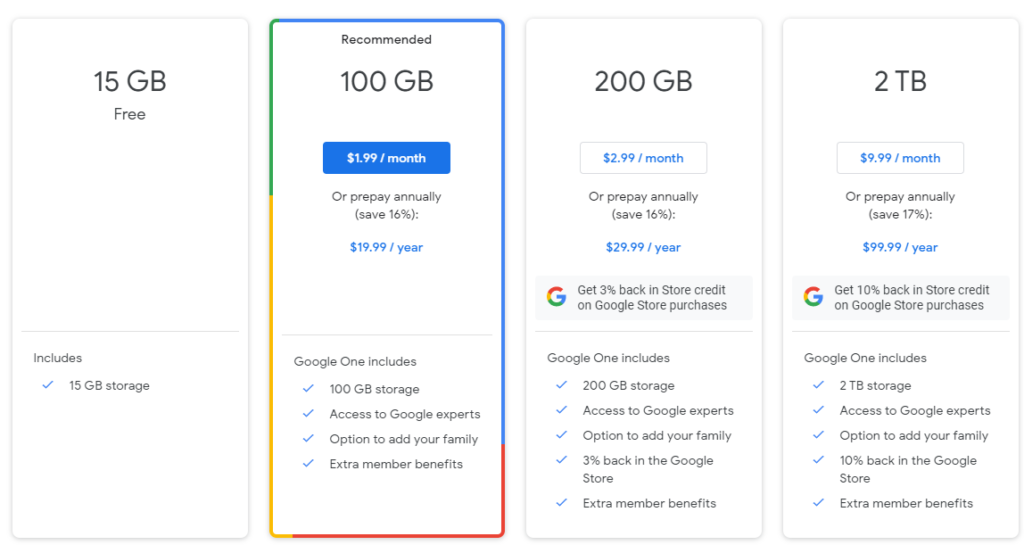
#3. Microsoft OneDrive – Best for personal use
• Best for personal use
• Automated backups, offline access, and file sharing
• Personal Vault gives you identity verification and higher security
• Starts free with 5 GB of storage
• Try it today
Some of their standout features include:
- Automated backups
- Offline access
- File sharing
- Document scanning with mobile device
- Personal Vault for more protection
The personal Vault is a great product. Not only is it protected with identity verification, but it also allows you to store your most important files without worrying about them being accessed by bad actors. You’ll be able to access those files anywhere with a mobile device or computer too.
They do offer a suite of products and services for business such as enhanced team collaboration features (grant expiring access, create shareable links, etc). One nice stand out is their collaborative Microsoft Word editing. Like Google Docs, you and your team can access one Word document and edit it live together without having to share the same file back and forth.
That said, I don’t suggest using OneDrive for business if you can help it. Since it’s a Windows product, it’s much more limited in where it gets shared and how the files can be used. As such, it’s a much better solution for PC families who are looking for a good way to share personal files like photos and documents with one another.
Personal home plans start free for 5 GB of storage. However if you’re a business, you have a host of solutions and plans that should fit your needs.
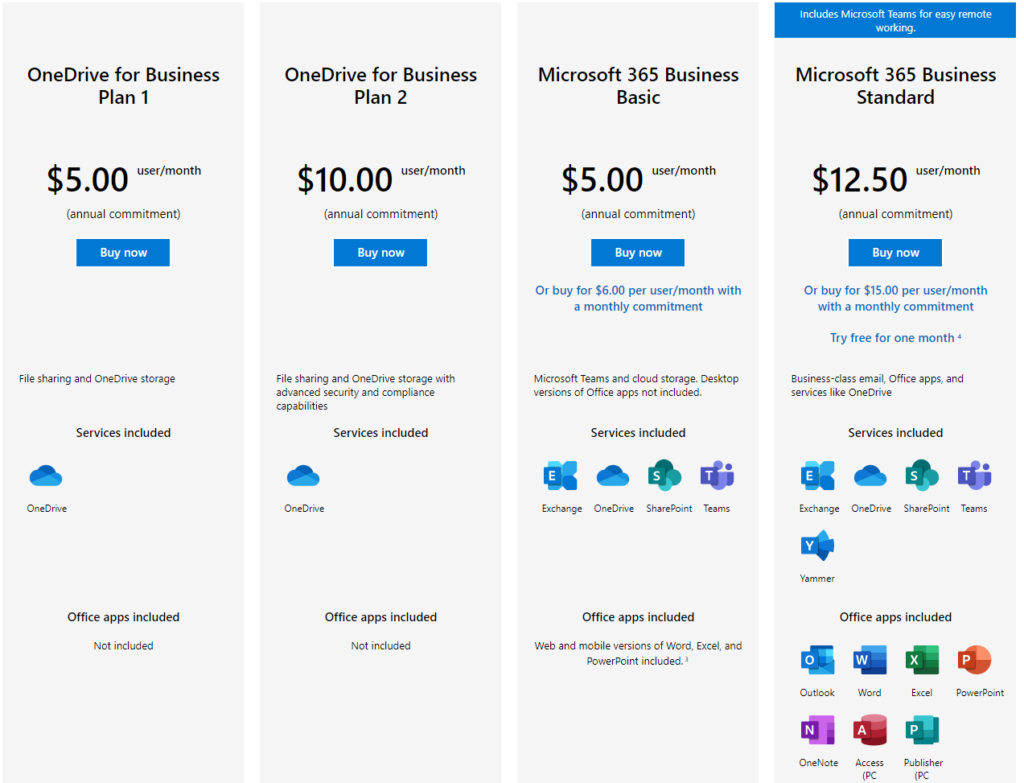
I highly recommend at least the Microsoft 365 Business Basic plan. At $5/user per month, you’re getting a host of services like SharePoint and Teams as well along with web versions of Word, Excel, and Powerpoint.
#4. Apple’s iCloud – Most intuitive cloud storage service
• Most intuitive cloud storage service
• Easily search and browse photos and files
• Excellent for photos
• Starts free with 5 GB of storage
• Try it today
If you’re one of the many millions already using Apple products, you’re already using iCloud. In fact, it’s built into every single iPhone, iPad, iMac, Macbook, and other Apple devices. With iCloud you automatically get 5GB of data storage for free.
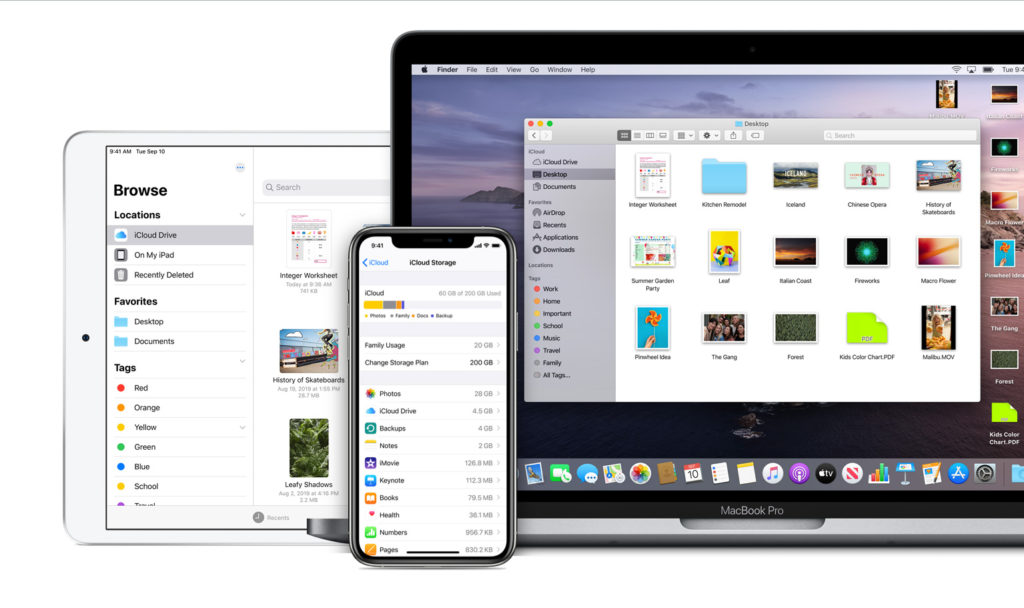
iCloud allows you to easily search for and browse your photos and files going as far back as you began to store them on their solution. Not only that, but you’ll be able to easily share them as well.
In fact, this service seems as though it’s tailormade for photos. You’ll be able to create albums and iCloud even brings up memories for you to look back on on specific anniversaries of when you took photos.
Aside from photos, you’ll also be able to easily store and access different files and documents on your iCloud.
iCloud is easily the most user-friendly and intuitive cloud storage solution on your list. Apple’s team of user experience professionals created a very simple but powerful experience for even the newest Apple user.
Prices are affordable too if you want to scale beyond the free 5 GB (which you will want to if you’re running a business).
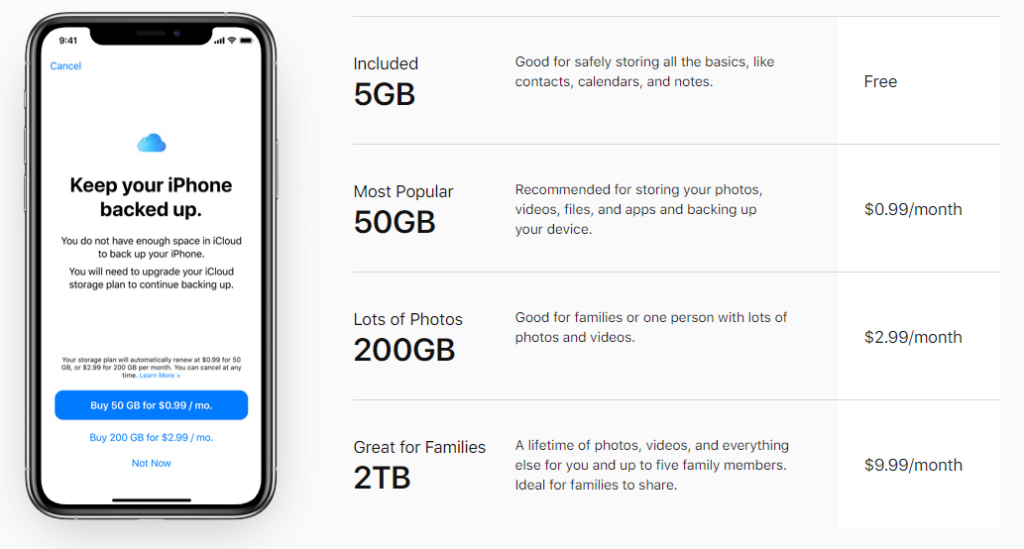
#5. Dropbox – Best all-around cloud storage solution
• Best all-around cloud storage solution
• Great integrations
• Store and share files, documents, photos, videos, and more
• Automatic syncing
• Try it today
The apocryphal origins of it begin with founder Drew Houston who kept on forgetting his flash drive when he was a student at MIT. After one lost USB drive too many, he decided to create a solution to allow him to access files anywhere.
And thus, Dropbox was born.
Since then, Dropbox has grown into a massive file storage platform. You’ll be able to store and share documents, photographs, videos, cloud content, and more. The services sync quickly as well, which means you’ll get the latest version of whatever file you’ll want access to.
Dropbox also comes with great integrations as well. You’ll be able to connect with tools and solutions you likely already use in your daily life and at the office such as:
- Slack
- Zoom
- Google Cloud
- Salesforce
- Microsoft
- Adobe
- Trello
- HelloSign
And more. They even offer a tool called Dropbox Paper which allows you to collaborate with your team on an automatically synced platform.
Prices start free—but you only get 2 GB with that plan. That’s easily the lowest of anyone on the list by a wide margin. If you’re looking for a free plan, I highly suggest you look elsewhere (cough Google Drive cough).
Paid plans start at $9.99/month which gives you 2 TB of data storage. You read that right. It’s a massive leap from 2 GB but you’ll be getting a TON more storage as well as features like Smart Sync, camera upload, and 30-day account rewind.
How to choose the best cloud storage service
The cloud storage service you go with ultimately comes down to your unique needs and tastes.
That said, there are a few things that you should look for if you want to get the best one. Below are three big features that played an integral role in how we compiled this list. Use them to help guide you in your decision making process.
Syncing
No matter what device you use to access and store your files, you should make sure that it syncs automatically with the cloud. After all, you’re likely using the storage service because of how you can attain your files and documents anywhere with an Internet connection.
If it isn’t syncing with all your devices, then it’s not going to be accessible when you need it. That’s why you should always make sure that the cloud storage service you use includes automated syncing.
Luckily, this comes default with many cloud storage devices already. However, not all automated syncing is made equal. Some of them require you to choose specific folders and files you want to sync automatically. Others just do it across the board.
If you’re looking for a cloud storage service for your business team, you’ll want to make this your number one priority.
Integrations
A cloud storage service that doesn’t integrate seamlessly into your current work tools and processes isn’t a good one for you. If it’s integrated, that means it’ll provide an easy and intuitive way for all of your colleagues, team members, or even your family and friends to share and store files.
A few things that we require for our cloud storage services here at Quick Sprout is syncing with Trello and Slack because those are two tools we use often and every day.
Take stock of the software you use often as well and check the cloud storage service you’re considering to see if they offer integrations with it.
Scalability
This is sneakily important. Many people don’t consider whether or not a service or product can grow with them until it’s too late.
If you’re a small business, you’re not going to need the same amount of storage as a huge corporation like Google. So you’re going to choose a small storage plan at first.
However, if you plan on growing your business (and you are), you want to make sure that the cloud storage service offers plans that allow you to do so.
That’s why you should make sure that the services you are considering offer an easy way to switch plans and storage capacity. If they don’t, you might find yourself with a lot of headaches down the line when you need to transfer all of your files and documents to a new cloud storage service.
• Best for backups
• File syncing, multiple device backups, and more
• 256-bit AES encryption
• Prices start FREE
• Try it today
Conclusion
Here are the five best cloud storage services again:
- iDrive – Best for backups
- Google Drive – Best free cloud storage service
- Microsoft OneDrive – Best for home use
- Apple’s iCloud – Most intuitive cloud storage service
- Dropbox – Best all-around cloud storage solution
Remember: What you ultimately choose is up to you and your preferences. But you really can’t go wrong with any of the above on the list.
from Quick Sprout https://ift.tt/3cXI44g





No comments:
Post a Comment